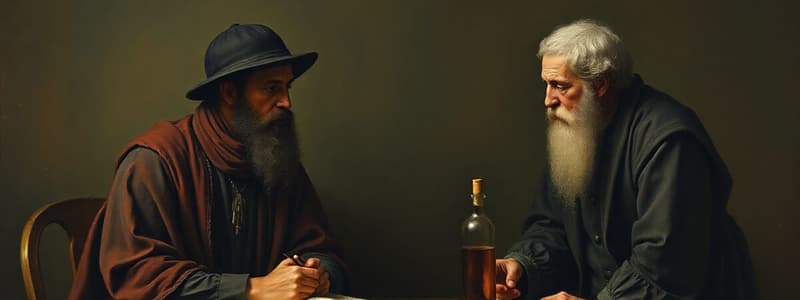Podcast
Questions and Answers
What is the primary focus of moral philosophy as established by Socrates?
What is the primary focus of moral philosophy as established by Socrates?
- Concepts like justice, courage, and piety (correct)
- Historical analysis of philosophical texts
- The study of physical sciences
- The observation of natural phenomena
What does the Socratic Method primarily utilize for philosophical inquiry?
What does the Socratic Method primarily utilize for philosophical inquiry?
- Cooperative argumentative dialogue (correct)
- Empirical measurements
- Sociological surveys
- Formal experiments and observations
What does the acronym 'STOP' in Moral Theology refer to?
What does the acronym 'STOP' in Moral Theology refer to?
- Search, Think, Others, Pray (correct)
- Search, Test, Observe, Pray
- Study, Teach, Operate, Pray
- Stop, Talk, Observe, Pray
How does philosophy as a discipline primarily acquire knowledge or truth?
How does philosophy as a discipline primarily acquire knowledge or truth?
What is described as the process of thinking logically to form a conclusion or judgment in philosophy?
What is described as the process of thinking logically to form a conclusion or judgment in philosophy?
Which of the following best defines the term 'dialectics' in philosophical argument?
Which of the following best defines the term 'dialectics' in philosophical argument?
What concept did Wiler present in his book 'Sex, Ecology, Spirituality'?
What concept did Wiler present in his book 'Sex, Ecology, Spirituality'?
What does 'Philosophia ancilla theologiae' imply about the relationship between philosophy and theology?
What does 'Philosophia ancilla theologiae' imply about the relationship between philosophy and theology?
Flashcards are hidden until you start studying
Study Notes
Key Questions of Philosophy
- What is the meaning of life?
- What is the nature of reality?
- What is the good life?
- What is knowledge?
- What is justice?
Importance of Key Questions
- They challenge us to think deeply about ourselves, our world, and our place in it.
- They help us to understand our values and beliefs.
- They can lead us to a more fulfilling and meaningful life.
- They provide a framework for ethical decision-making.
- They promote discussion and debate, which can lead to new insights and perspectives.
Philosophical Tools and Processes
- Socrates - focused on ethics and how humans should live, exploring concepts like justice, courage, and piety.
- Socratic Method - questioning and engaging with others in a dialogue to stimulate critical thinking and understanding.
- Dialectics - a method of philosophical argument involving opposing perspectives to arrive at truth.
- Reasoning - the logical process of forming conclusions or judgments, a fundamental practice in philosophy.
- Two Types of Reasoning:
- Deductive Reasoning: moves from general principles to specific conclusions.
- Inductive Reasoning: starts with specific observations and draws general conclusions.
Philosophical Reflection
- Reflection - a process of examining thoughts, feelings, and actions to learn from experiences.
- Two Types of Reflection: (Marcel)
- Reflection as a response to the world - this type of reflection is driven by external stimuli.
- Reflection as a search for self-understanding - this type of reflection is driven by an internal desire to know oneself better.
Moral Theology and STOP
- Moral Theology - a study of religious faith, practice, and experience focused on ethical behavior derived from religious teachings.
- STOP - a guidepost for moral decision-making in Moral Theology:
- S - SEARCH out the facts - gather information about the situation
- T - THINK - analyze the facts and consider possible consequences
- O - OTHERS - how does this decision affect others?
- P - PRAY - seek guidance and wisdom through prayer
St. Thomas Aquinas, Philosophy and Theology
- St. Thomas Aquinas - a prominent theologian of the church.
- Philosophia ancilla theologiae - "philosophy is the handmaid of theology."
- Philosophy serves theology by providing a foundation for understanding religious truths.
Framework and Aqal
- Framework - a conceptual map built on beliefs and values, influencing an individual's worldview.
- Aqal - a term introduced by Wiler in his book "Sex, Ecology, Spirituality", encompassing all quadrants and all levels.
- All Quadrants, All Levels - a comprehensive model that aims to understand different aspects of reality by integrating diverse perspectives.
Studying That Suits You
Use AI to generate personalized quizzes and flashcards to suit your learning preferences.




